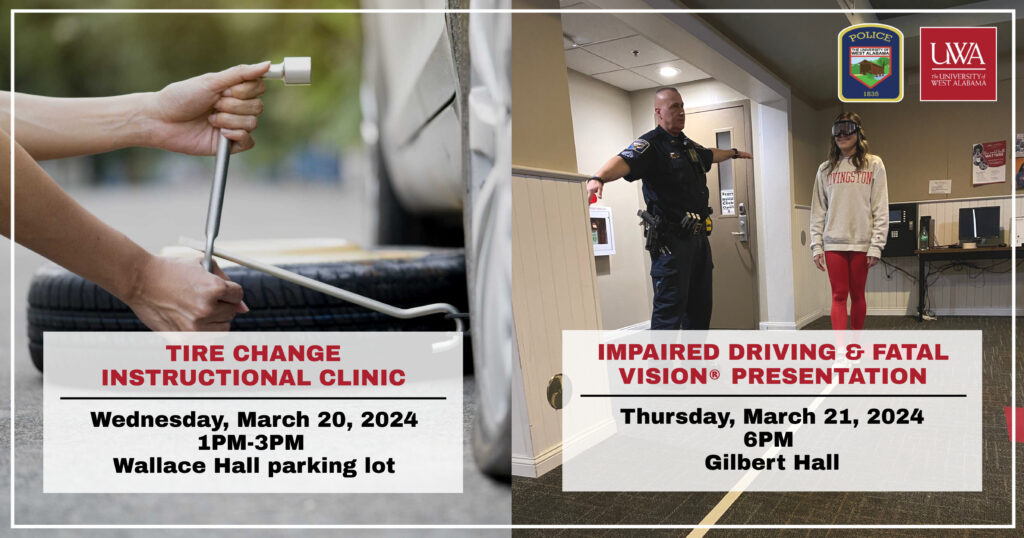
Story: Lisa Sollie
Spring break for many college students is synonymous with travel, whether back home or a vacation destination. To encourage safety on the road before the University of West Alabama’s spring break, March 25 through 29, the University Police Department is offering two events: a tire change instructional clinic Wednesday, March 20, from 1-3 p.m. and an impaired driving and Fatal Vision® presentation Thursday, March 21 beginning at 6 p.m. that lasts approximately 60 to 90 minutes.
“Our students will be on the road the last week of March, and because their safety is important to us whether they are on campus or not, we wanted to offer these two events before they leave for spring break,” noted UWA Police Chief Josette White.
According to Torque News, tire puncture occurs every seven seconds in the United States, resulting in roughly 220 million flat tires each year. To ensure all students know how to use a vehicle’s spare tire, UWA police officers will offer demonstrations in Wallace Hall parking lot beginning at 1 p.m. on March 20. Officers will also show the proper jack placement for students’ vehicles.
The second event is one that UWA PD hopes will bring awareness of the dangers and consequences of impaired driving.
The UWA Police Department will give a short presentation Thursday, March 22, beginning at 6 p.m. at Gilbert Hall. Officers will also conduct field sobriety tests on students who try on the department’s Fatal Vision® goggles, which use various lenses to shift the wearer’s view and cause a loss of balance and equilibrium. The effect of wearing them mimics impairment due to alcohol or marijuana use, a concussion as well as drowsy or distracted driving.
“Impaired driving crashes are 100 percent preventable,” said Ann Carlson, National Highway Traffic Safety Administration’s (NHTSA) acting administrator. According to NHTSA, alcohol impairment is one of the leading causes of death on our nation’s roads. In 2021, the latest data available, more than 13,300 people died in alcohol-impaired driving traffic deaths — a 14 percent increase from 2020.
NHTSA also estimates that 2,000 college students between the ages of 18 and 24 die each year, and the highest fatality rate is among college students who are between 21 and 24 years old.
“Most students that we have dealt with on campus do not know what to do if they have flat tire while driving,” noted White. “Hopefully our tire change instruction clinic will give them knowledge and skills they can take with them the rest of their lives. We also want our students to learn valuable information about the dangers of impaired driving without experiencing the harsh consequences. We just want them to have a safe and fun spring break.”